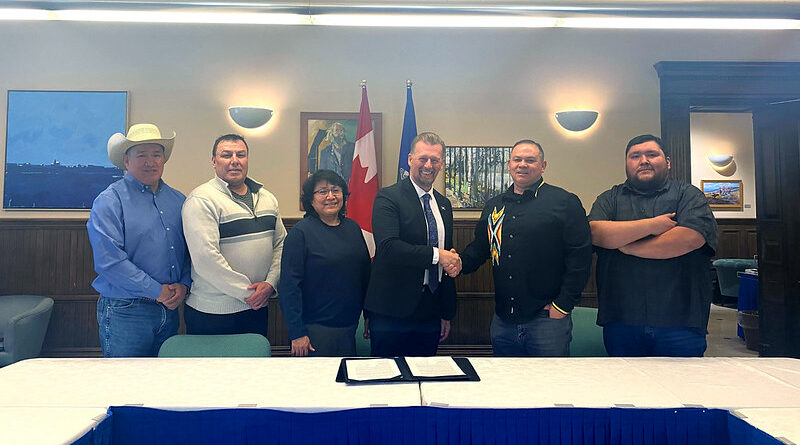Siksika, Alberta sign letter of intent regarding self-administered police service
By John Watson Local Journalism Initiative Reporter

Photo Courtesy of the Government of Alberta
Siksika Nation Chief Ouray Crowfoot and the Public Safety Task Force have signed a letter of intent with the Government of Alberta regarding the establishment of a self-administered police service.
A signing ceremony was held in Calgary, April 24, to formalize the partnership, and the letter will be finalized by sending it to the federal government for signing.
“It is a follow-up on recent announcements in the past, and this is just to put on paper that we are going to be moving forward in pursuing our self-administered police service,” said Siksika Coun. Ruben Breaker. “It has been a long time coming. We had our police service from 1991 to 2001 and the service was discontinued. Now, leadership from then to today have been trying to get our police service back. It is very exciting.”
Siksika Nation and Alberta signed a memorandum of understanding in July 2022 to work towards establishing the service for Siksika Nation.
In September, Crowfoot and Minister of Justice Tyler Shandro brokered a deal with federal Minister of Public Safety, Marco Mendicino.
“One of Siksika leadership’s top priorities is to help improve the quality of life for our people. Safety and security are basic human needs to improve life expectancy, quality and quantity of life,” said Crowfoot. “It is paramount for our people to feel safe in their own community. Siksika Nation’s re-establishment of our own Siksika-administered police service will go a long way towards improving our people’s quality of life.”
The Alberta government provided Siksika Nation with a $30,000 community policing grant in 2018 to fund a feasibility study which lead to the 2022 signing.
When Siksika Nation’s police service is officially established, it will be the first self-administered First Nation police service of its kind to exist in Canada in 14 years.
“It is much needed for First Nations to have our own police service. There is something about our people policing our own because you get the language factor, the culture, some protocol – it is something that is not there today,” said Breaker.
“We will still be working with the RCMP for major crimes and some of the major services … but the day-to-day stuff will be our own jurisdiction.”
Breaker added there are currently two obstacles which Breaker described as halting progress on the development of the service. These being the upcoming provincial election, as well as the federal workers’ strike.
Until those are resolved, he explained there will be no more interactions between Siksika Nation and the governments.
The next step in the process, being described as Stage 2, is for the Police Commission to finalize the policies, planning for the Siksika police building and equipment, as well as sorting out a host of other administrative information.
Ultimately, Breaker said the process will take place in four stages, and the Siksika Police Service is estimated to activate within the next 12 to 18 months.
